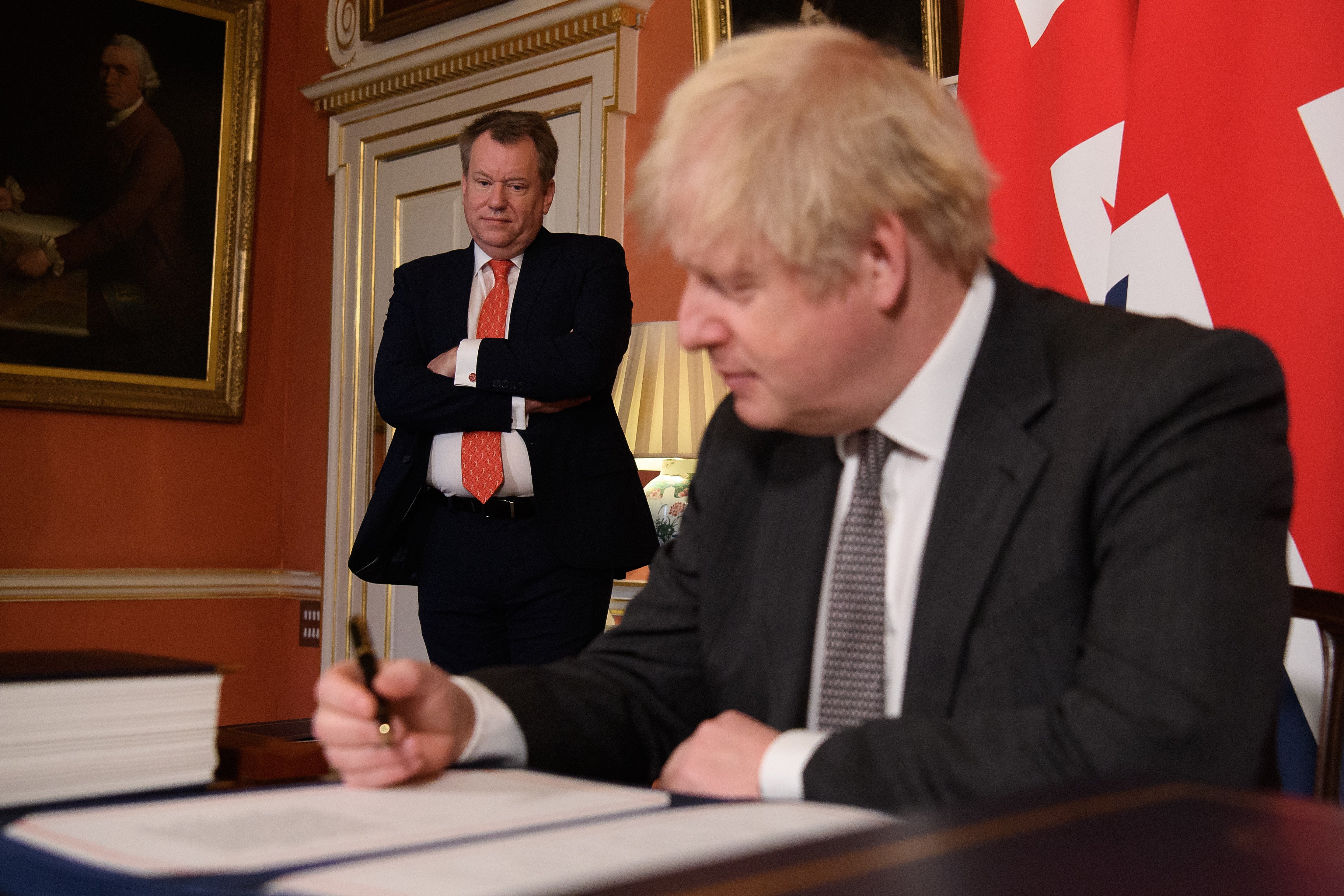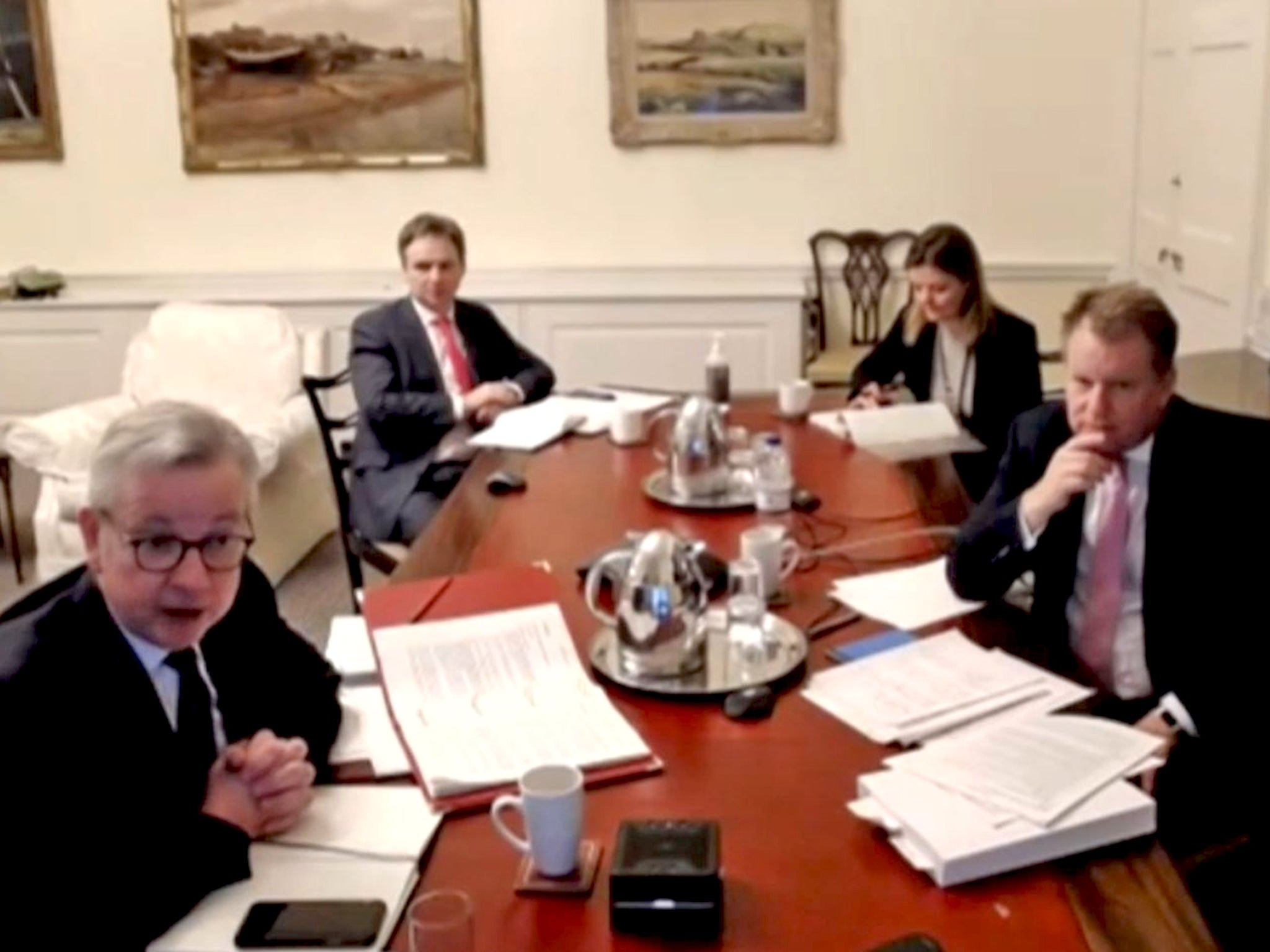Could Boris Johnson’s newest cabinet member end up undoing Brexit?
If the appointment of David Frost is to be the symbol and substance of an even more assertive attitude to Europe, it carries obvious risks to trade, jobs and investment, writes Sean O’Grady


The effusive mutual tweeting of Lord (David) Frost and Michael Gove on the occasion of Frost’s elevation to the cabinet is so gushing it invites scepticism. Now that Frost is taking over Gove’s responsibilities for relations with the European Union, Gove declares there is “no one” better to put in charge, which begs some questions about how he was performing. The answer to that, according to some of the briefing, is “not tough enough” in the eyes of Boris Johnson.
For his part, Frost sees himself as merely “standing on the shoulders of giants”, and on the titanic figure of Michael Gove in particular. Praise indeed, and in a redolent phrase usually associated with Sir Isaac Newton. It defies belief, if not gravity, to launch Gove into such exalted company.
By the look of things, Gove was rather enjoying himself winding up Britain’s membership of the European Union. As one of the few genuine lifelong Eurosceptics in the government it must have been rewarding to be able to argue Britain’s case at the highest level, chairing important joint committees and finessing the most dangerous threats to the status of Northern Ireland within the UK (a cause he is also passionate about).
Now Mr Brexit has given way to Lord Brexit, and it is messy, though not unusually so for Downing Street. The former Brexit negotiator was supposed to be given the job of national security adviser, until it became apparent that he was underqualified and overly political. Now Frost will be in the cabinet, alongside Gove, and thus appointed and answerable to Johnson; though Frost will be a junior minister to Gove, who will presumably take the relevant business in the Commons. Who will Frost talk to in case of some difficulties with our European friends – Gove, Johnson or both?
It doesn’t seem to leave Gove with much to do, beyond his mostly nominal role as the chancellor of the Duchy of Lancaster, a constitutional anachronism connected with the crown estates in the northwest.
Again, the spin is that Gove’s administrative talents will be redeployed to sorting out the backlog of post-pandemic work around the public services – hospital waiting lists, the courts and school exams, for example.

The scope for further internecine strife is plain. Frost will inevitably find himself jostling with Dominic Raab and the Foreign Office, especially over bilateral relations with the EU’s 27 member states. Supposedly Frost will stick to EU matters, but that is pretty much everything in some way or other. Raab is probably feeling a little bruised by now, and his diplomats may find themselves conflicted if Frost starts calling them up and telling them what do, not least because Frost and Johnson’s agenda is essentially hostile to closer UK-EU cooperation.
By the same token Matt Hancock, Gavin Williamson and Rob Buckland will be entitled to ask who is actually responsible for running their respective departments. Perhaps Gove will be a hands-off, avuncular figure, but what if things gone wrong with the post-Covid recovery in the public services? Who gets the blame?
Constructive ambiguity and creative tension have their place in government, though usually not sufficient to compensate for the disadvantages and confusion, especially with an uninterested Downing Street just leaving them all to get on with it. Gove, again according to the gossip, might also like a more high profile role in preventing Scottish independence. As a proud Scot he’d seem an obvious choice, but he might be no more popular in Scotland than Johnson. It is something of a poisoned chalice, given how well the SNP is doing just now.
A complicating factor is the arrival in Johnson’s entourage of two special advisers (Baroness Finn and Henry Newman), reportedly “friends of Gove” and “friends of Carrie Symonds”. Nor should it ever be forgotten that Gove stabbed Johnson in the front during the 2016 leadership election, when Gove said Johnson wasn’t up to the job of PM. It does seem an especially courtly way of running the country, even without Dominic Cummings around.
So there will be trouble for these politicians; but, more important, also for the country’s relationship with Europe. If the appointment of Frost is to be the symbol and substance of an even more assertive attitude to Europe, it carries obvious risks to trade, jobs and investment. Politically, any attempt to unilaterally redraw the Northern Ireland protocol will destroy the EU withdrawal agreement and breach the Good Friday Agreement – two international treaties. Logically, it leads inexorably either to a hard border on the island of Ireland, or the unification of Ireland. Mr Johnson’s quest to give his friend a reward for getting Brexit done could end up undoing Brexit, the union and the Johnson administration itself. No one then will be speaking of standing on the shoulders of any giants.


Join our commenting forum
Join thought-provoking conversations, follow other Independent readers and see their replies
Comments